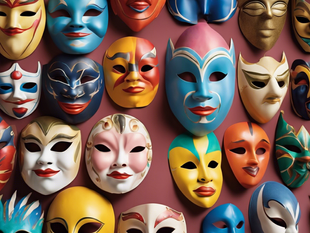In My Own Words

Is Individuality an Endangered Concept in Today's Society?
Feb 21
3 min read
2
5
0
How does someone acquire an original thought? How do we know that we have not been trained to think a certain way, generating the same ideas and structures? How do we find an idea that is truly original? The truth is, I'm not sure if we can.
Everyone is influenced by something. In today’s society, social media profoundly impacts our perceptions, beliefs, and ideas. Algorithms determine what we see, shaping our thoughts without us even realizing it. The constant stream of information reinforces certain opinions, making it harder to break free from the cycle. Fake news spreads, false political statements circulate, and before we know it, our thoughts become a reflection of the content we consume rather than something uniquely our own.

The Depth of Influence
Our influences extend beyond social media. Family plays a pivotal role in shaping our beliefs from an early age. The way we speak, the values we hold, and even the biases we develop often stem from our parents, siblings, and the environment we grow up in. Education, religion, culture: each one acts as a guiding force, molding us into who we are. The books we read, the shows we watch, and even the casual conversations we engage in all serve as pieces in the puzzle of our identity.
Even our deepest personal convictions often stem from those who came before us. Every idea, every movement, every innovation builds upon something else. The music we love, the art we admire, the literature we resonate with, none of it exists in a vacuum. Everything is a remix, a reimagining of past influences in a new form. Consider some of history’s greatest thinkers, Plato built upon Socrates, and modern physicists expand upon Einstein’s theories. Innovation is rarely about creating something from nothing; it’s about refining and reshaping what already exists.
The Role of Social Media Influencers
One of the most significant forces shaping individuality today is social media influencers. These individuals often dictate fashion trends, lifestyle choices, political opinions, and even career aspirations for millions of followers. Their curated online personas create an illusion of authenticity while subtly guiding consumer behavior and personal beliefs.
Influencers can either stifle individuality, encouraging conformity to a specific aesthetic or ideology, or inspire it by showcasing alternative perspectives. The rise of micro-influencers and niche communities has made it easier for people to explore unique identities outside mainstream trends. However, the pressure to conform to viral trends can make it difficult for people to develop their own sense of self without external validation.
As platforms like Instagram, TikTok, and YouTube continue to grow, the challenge is to distinguish between genuine self-expression and algorithm-driven conformity. Are we making choices based on personal interest, or are we subconsciously influenced by the influencers we follow? Recognizing these subtle impacts is key to reclaiming a sense of individuality in a digital age.
The Illusion of Originality
If we were to strip away all societal influences, could we finally achieve pure, original thought? Theoretically, the only person capable of having a completely original thought would be someone raised in total isolation, locked away in a cabin with no exposure to language, media, or external influence. But even then, their thoughts would be shaped by their environment, by their solitude, by their survival instincts.
In reality, individuality is not about being untouched by influence. It is about how we weave those influences together to create something that feels uniquely our own. Our originality comes from the way we interpret the world around us, how we combine ideas, and how we express them in ways that have never been done before.
Finding Individuality in a Connected World
While complete originality may be impossible, individuality is not. We define ourselves by the choices we make, the perspectives we adopt, and the way we apply our knowledge. Creativity flourishes when we take the familiar and mold it into something new. Every thought may have roots in the past, but the way we cultivate those ideas is what sets us apart.
Furthermore, the concept of individuality is fluid. It evolves as we evolve, shaped by our experiences and the people we meet. Our personal journey of self-discovery allows us to add our unique voice to the collective human story. The challenge is not to be completely uninfluenced, but rather to be conscious of those influences and decide for ourselves which ones we embrace and which ones we challenge.
Conclusion
So, is individuality dead? No. But it is evolving. In a world where we are constantly influenced, true individuality lies in the conscious effort to question, to explore, and to forge our own path, no matter how interconnected that path may be. The key is not to escape influence but to be intentional in shaping our own perspectives. Individuality isn’t about complete isolation; it’s about finding our unique space within the web of ideas, experiences, and relationships that define human existence.





